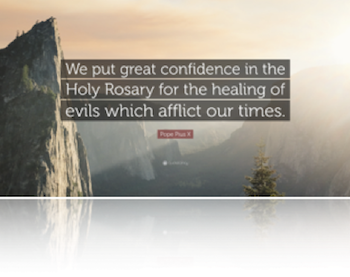The Origin Of The Rosary
In Celebration Of October,
Month Of The Rosary

Many say the Rosary daily, reciting this prayer not only in church but during special times and places we set aside. Many keep the beads in their pocket, hang them in cars, put them on bedposts. They may be part of the essentials carried every day, such as keys, wallets or purses. When lost or misplaced, many may feel incomplete until the beads are found or a new set is in their possession. But when did this whole idea of counting beads while praying begin? Where did the Rosary originate?
For centuries long before Christ, the faithful said prayers in a repetitive manner and found different methods of keeping count, often by using rocks or pebbles. By at least the ninth century, monks were reciting all 150 psalms, at first every day, but later every week as part of their prayers and devotions. One way they kept track was to count out 150 pebbles and then place one pebble in a container or pouch as they said each psalm. People living near the monks wanted to mimic this devotion, but due to lack of education could not memorize all the psalms. Printed copies, even if individuals could read, were not available as the printing press was centuries away. So Christians began to pray 50 or 150 Our Fathers (or Paternosters) each week instead of the psalms. In order to keep count of the Our Fathers, they often used string with knots in it instead of counting on rocks. Later the knots gave way to small pieces of wood and eventually to the use of beads.
MEDITATION
The Holy Rosary is considered a perfect prayer because within it lies the awesome story of our salvation. In fact with the Rosary, we meditate the mysteries of joy, of sorrow and the glory of Jesus and Mary (Note: later, the Luminous mystery was added). When Catholics recite the rosary, they meditate on the mystery associated with that decade. If they merely recite the prayers, whether vocally or silently, they are missing the essence of the rosary. It is not just a recitation of prayers, but a meditation on the grace of God. Critics, not knowing about the meditation part, imagine the rosary must be boring, uselessly repetitious, meaningless, and their criticism carries weight if you reduce the rosary to a formula. It is the meditation on the mysteries that gives the rosary its staying power.
(Excerpt from Emmons The Catholic Answer)